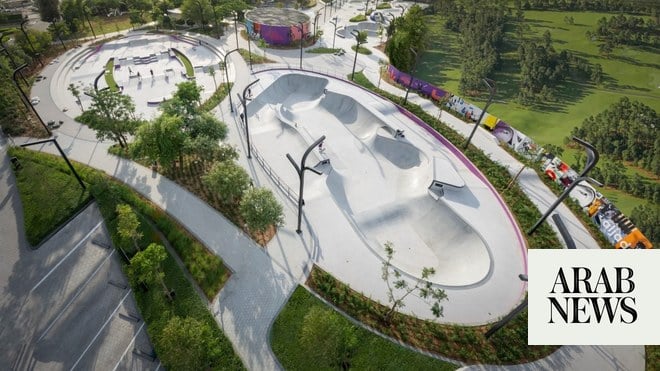
LONDON: Skate-Aid is a charitable organization that develops skateboarding parks and initiatives around the world, founded on a vision of empowering children through active participation in the sport and with a particular focus on locations where kids face adverse living conditions.
For the latest updates, follow us on Instagram @arabnews.lifestyle
“The parks provide a safe space where children don’t have to be tough guys like they do on the streets,” says Tobias Egelkamp, head of projects at Skate-Aid. “In our international projects we almost exclusively operate in areas of deprivation where children are exposed to child labor, drugs, gangs, bad or no education, and where they don’t see a future. With our educational work through skateboarding, we can give those children a sense of direction.”
Skate-Aid is based in Germany, but operates in countries across the world, including projects in Palestine, Syria and Afghanistan. Egelkamp, who became head of projects in 2018 (having worked as a volunteer in South Africa and in Skate-Aid’s head office for several years), was heavily involved in the Syria project — a skate park in Damascus — which began in 2018.
“My role was connecting everyone who worked on the project — architects, project partners, donors, volunteers, those working on budgeting and so on,” Egelkamp tells Arab News. “We had a lot of people helping us on our mission, and it’s thanks to all of them that these projects are possible.”
Parks such as the one in Damascus can play a complex, vital role in children’s lives, Egelkamp says. “Kids use skate parks all over the world as urban-culture areas and playgrounds to skate and explore possibilities in their development.” At the Damascus park — and many of Skate-Aid’s facilities, however, “Those children have very different backgrounds, possibilities, education and so on. In many cases, the skate park and skateboarding itself symbolize freedom and possibilities they do not really have in their lives.”
Developing the project in a country ravaged by conflict had the potential to be dangerous, so Skate-Aid partnered with local organization SOS Children’s Villages Syria.
“The area is close to Damascus, and pretty much safe, so our volunteers and partners could move freely there,” Egelkamp says. “Thanks to that local guidance, we never felt in danger. However there are certain restrictions on movement and you cannot travel around since the danger of kidnapping is high in other areas. From my point of view, our work there is a calculated risk.”
That risk, however, makes it possible to manifest the positive impact of the skateboarding initiatives - and offer children in Damascus an escape from Syria’s ongoing unrest.
“Each project has a slightly different approach,” says Egelkamp. “From working with street kids in South Africa or impaired kids in Namibia, to possibly traumatized kids in Syria and Palestine — the projects are adapted to those respective needs. Our partners ensure we keep cultural differences in mind, so each project is unique in its own way. What stays the same is the skateboarding, and the welcoming character of the people we meet in each country.”
Ensuring each project is bespoke makes the job harder for Egelkamp and his teams, but the payoff, he believes, is worth it.
“I think skateboarding gives kids a sense of belonging and direction, which is even more important since — in the areas we operate in — this is often what’s missing.”
The Syrian park has certainly struck a chord with the children of Damascus.
“There were more kids attending the workshops than any (we’ve done) before,” explains Egelkamp. “Over 300 registered in the first week. Many of them helped during the construction phase, so it’s basically their skate park too.”
Due to the COVID-19 pandemic, Skate-Aid has had to pause programs around the world and recall its volunteers. Egelkamp says he plans to head back to Syria as soon as possible, and it’s clear he’s eager to make up for lost time with the charity. And that includes more projects in the Middle East.
“In 2021, we’ll focus on catching up,” he says. “This includes the extension of our project in Uganda, starting programs and building a small skate park in Nepal, and going to Kazakhstan. But for sure, Syria will not be the last project in the Arab world.”












